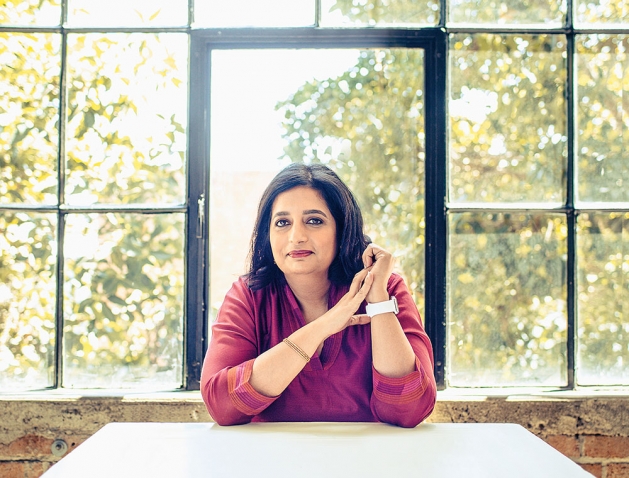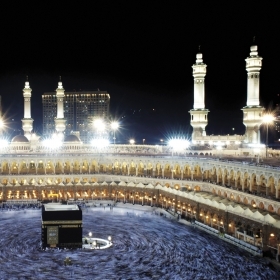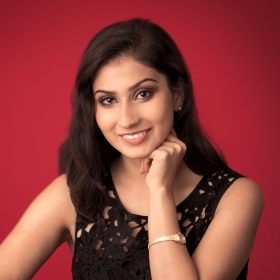As freezing rain turned to snow in Boston one spring Saturday earlier this year, American Muslims covered in yellow, pink, and green rida dresses gathered in an empty private-school classroom along with some Jews and Christians. Each person arrived carrying a complicated mix of feelings—fear, anger, and resolve. In that space, they put their faith in Farhana Khera ’91, executive director of Muslim Advocates and the woman they hoped would lead them to a better way forward.
Khera was the featured guest at the event, called “Transforming Angst to Action”—and both the angst and desire for action were loud and clear. For hours, the group of about 50 talked about some of President Donald Trump’s policies they worried could affect them, but also about the discrimination that they felt long before he entered politics.
American Muslims have become increasingly motivated to advocate for their community in the current political climate, explains Tasneem Dahod Dohadwala ’04. She organized the event on her own time because, she says, “When you see your son in tears because he believes that his president has un-American values and does not represent what we are as a country, it could fire anyone up.”
Parents in the group spoke about their children being bullied in school. Young people voiced concern over alleged hate crimes against Muslims and opposition to the building of mosques.
They dwelled on the people who feared them the most. But perhaps surprisingly, not on how they could fight back, but on how to make themselves available to encourage a better understanding of their faith.
“Muslim communities need to stop focusing on just their families and their insulated communities. We need to take risks and begin dialogues,” Dohadwala later said. “So much of this angst comes from people being in fear, so it’s our responsibility to work to assuage those fears. We, Muslims, are only here to embark on the grand American dream just like everyone else.”
In many ways, there is nobody better positioned to help the community find its voice than Khera. Muslim Advocates is a small but growing organization that fights discrimination against American Muslims with “high-impact lawsuits,” educates community members about its legal rights, and lobbies Congress, as Khera puts it, to give American Muslims a seat at the table.
“Each and every one of us has a responsibility to make sure our country is living up to its ideals,” Khera told the audience, as she patiently answered question after question from the assembled group.
And Khera assured the group that, with their help, she believed it could all get better.
The Climate
Khera says she hears more fear from her community members now than she has in the past 12 years, the period she has been at Muslim Advocates. And she doesn’t necessarily mean because of President Trump. She describes a “dark underbelly of the country” that she believes the latest election exposed—something she says is not new and “is going to be with us for quite some time.”
About a year before winning the 2016 election, then-candidate Trump called for a “total and complete shutdown” of Muslims entering the country until Congress strengthened vetting procedures. The administration has backed off that specific pledge, but did order people from several Muslim-majority countries to be barred from entry into the U.S.
While many on the left view the ban as extreme and discriminatory, the administration has wide support—nearly half the country (47 percent) is in favor of the immigration ban, according to a February CNN/ORC poll.
The ban, enacted through executive orders, has been through a couple iterations, and is now is being challenged in court through several cases, including one by Muslim Advocates.
The organization also created a reporting form on its website for people detained at the border that is a window into the current climate. The form asks questions like: “Were any electronics examined or copied?” and “Were you asked to share your social media accounts or recent internet browsing history?”
Whiteboard calendars hang on the walls in Khera’s unassuming office in downtown Oakland, Calif., to track upcoming events. In the few months after Trump’s inauguration, she traveled nearly every other week to fund-raise, meet the American Muslim community, and lobby.
Khera, an attorney, recently attended oral arguments in D.C. district court, packed mostly with opponents of the immigration ban in the case. The organization filed to fight the ban along with partner organizations. The lawsuit argues that the ban violates the United States’ guarantee of religious freedom and equality by preventing some Muslim organizations from bringing scholars to America.
The Trump administration insists that its immigration order is not a “Muslim ban,” but rather aimed at, per the White House website, “protecting the nation from foreign terrorist entry into the United States.” What to call it and how far-reaching it could be will continue to be debated, but one thing is clear: The fear among American Muslims is real and has been building for decades.
So while there is a frenzied nature to her current work, Khera actually has her eyes on a much longer game.

A ‘Smattering’ of Muslims
Growing up in Painted Post, N.Y., an overwhelmingly white, upstate town with a population of just under 2,000 (fewer than Wellesley’s student body), Khera says being Muslim was part of her “weekend identity.” Muslim families from an 80-mile radius would gather on weekends for Sunday school and social bonding and support.
When Khera arrived at Wellesley in 1987, the population of Muslims around her increased to a “smattering”—a few dozen, as she remembers it. That smattering included her sister, class of ’90.
Around Ramadan, the Muslim holy month of fasting, she wanted to re-create that same social support.
“Being away from home, [Ramadan] was particularly a time when you’re missing family being there, having that community,” she says. “You’re waking up at the odd hour at night to eat, and then you’re able to open fast and that kind of thing together.”
Together with some other students, she formed al-Muslimat (“the Muslim women”), a faith group for Muslim students that continues to thrive today.
Thick Skin
Khera’s senior year, she ran for College Government president in an election she remembers as fraught with tension. In the year before the election, when it came time to fund student organizations, she says, CG favored existing organizations. They declined to fund several new ones, including a South Asian student group she also helped start. The situation created a lot of animosity, and she remembers several students launching an anonymous campaign against her presidential candidacy. “They put up posters around campus [reading] ‘Don’t Support Farhana. She Doesn’t Support You,’” and left her what she calls “nasty” voicemail messages on her room phone, she says.
She won the election, and recalls advice from Nan Overholser Keohane ’61, then president of the College, that she clearly still lives by every day—even 25 years later. “You know, Farhana, this is basically politics,” Keohane told her, “and if you’re going to be in politics, you have to have a thick skin.”
“Nan had been through a lot of very tough fights” herself, Khera says, from the College’s divestment in South Africa to reconsidering its need-blind admissions policy.
That thick skin is serving Khera well these days. Anyone would need it—and comfortable shoes—to spend five minutes in Khera’s life. She is the target of hate on Twitter and blogs “on a regular basis,” she says. One user recently tweeted, “islam IS NOT a religion but an ideology of a pedophiliac psychopath killer” and another “SHAME on you! How is the travel ban affecting 6 of 50 Muslim-maj countries a Muslim ban? Have you no shame?”
Khera’s desire to become a lawyer was motivated by a passion for human rights. Being raised in upstate New York, she says, came with “a lot of freedoms to be able to do what I want, practice my faith however I want. If I want to go ride my bike, I can go ride my bike.”
When she visited relatives in Pakistan, she says, she “would see how differently situated my relatives, particularly my female relatives, [were].” Several of Khera’s more distant female relatives are illiterate, having not been given the same access to education as she was. “And freedom of movement [for women] doesn’t exist,” she says.
So all of those freedoms “you could easily take for granted in the U.S.” She recognized from an early age that “not everyone is treated in this way, and that these are certain fundamental freedoms that we should all have.”
Going straight to law school after college hammered home the value of the single-sex education she got at Wellesley. “I remember … settling down back in coed classes, and just being struck at how quickly and confidently guys would just shoot up their arms when it was question time,” she remembers. “By far, the women were very reticent, unless the woman went to a women’s college.”
Following law school, she worked for a private firm to “help pay off my law school debt,” managing to keep her passion for human rights and social justice alive. While she gained experience in litigation in the private sector, she worked on several cases pro bono—including representing an African-American man who alleged he was not promoted because of his race. The settlement was confidential, but she says she “really found that work satisfying, because I felt like I really helped people.”
But the private firm environment was ultimately not right for her. “I felt like, while it was great helping this group of people, I want to help effect change on a broader level … so that’s why I decided to pursue more of the policy side of things,” she says.

Filling a Void
As the planes hit the World Trade Center and the Pentagon on September 11, 2001, Khera had just started as counsel for the Senate Judiciary Committee.
“I was actually in a meeting with a colleague who worked for a Republican senator about potentially getting her boss to co-sponsor [a] bill to end racial profiling,” she remembers. “Little did I know.”
The conversation around racial profiling, which until that point had centered around traffic stops, exploded “in an instant,” Khera says. Suddenly, there was a national security element, talk of surveillance of Muslims, and ultimately the Patriot Act.
Signed fewer than two months after the attacks, the act made it easier to electronically surveil and, in some cases, wiretap citizens. It drew condemnation from American Muslim and civil-liberties groups and opened Khera’s eyes to how vital it was for her community to have a stronger voice.
“I had literally a front-row seat” during that time, she says, “and saw that suddenly, all of these laws and policies were being proposed and even enacted, that were directly affecting my faith community. But my faith community was not at the table.”
“We saw a real, tremendous void,” she continues, “and that was the need for the community to have a voice in the courts and in the policymaking process.”
The need to help her community find its voice during important policy decisions eventually moved her to cofound Muslim Advocates in 2005, along with other Muslim lawyers who had made similar observations.
“We had now seen this really enormous threat to our ability to enjoy the same rights and freedoms as our fellow Americans,” she says, “based simply on our faith background.”
Khera has now been at the helm of the organization, which has a staff of 10, for 12 years. In 2012, the group challenged the New York Police Department’s surveillance of American Muslims in coffee shops, halal delis, mosques, and universities. The organization is currently in settlement talks with the city of New York.
“What makes America great is that everyone is treated equally under the law,” Khera said in a statement at the time.
In 2011, she testified on Capitol Hill in the first-ever hearing on protecting the civil rights of American Muslims. She has appeared on CNN several times and earlier this year co-wrote a New York Times op-ed arguing that the second version of Trump’s immigration ban is still illegal.
Today, Khera says, there is a growing recognition of the importance of the policy and advocacy work she does—even in her own family and community.
The real turning point, she says, has come in the past few years when people see the need for her work advocating on behalf of the Muslim community in the courtroom and on Capitol Hill.
“In the last year or so, even with the older generation, I feel like there’s been more of an awakening,” she says. “I think as their kids have gotten older and are starting to have kids,” they have more firmly planted roots in the country. They are starting to realize, “oh, yeah, my grandkids are going to be affected by what’s going on.”
Standing at Ease in a Storm
In the midst of the angst and fear so prevalent in their communities, Khera and other community leaders express a remarkable sense of resiliency and optimism that the climate will improve.
On Wellesley’s campus, the pressures of college life are amplified for many Muslim students who have been thrust into the national spotlight because of their faith. The College’s Muslim chaplain Amira Quraishi likens her students’ need for support to that of someone suffering a trauma or an illness: Even if people don’t always know what to say, Muslim students just want their peers to tell them, “I want you to understand that I will walk through this suffering with you.”
Many in the Wellesley community have shown their support in concrete ways. Alumnae raised money to send care packages to Muslim students, the Multifaith Council spent an afternoon writing cards to “love bomb the Muslim students,” and a good crowd turned out at a teach-in about the immigration ban featuring Quraishi and members of the faculty.
Quraishi guides her students to the first verse of the Muslim holy book, the Quran.
“All praise in gratitude and awe belongs to the Lord (and teacher) of all of the world,” she quotes. “All of the world,” she continues, “really should make us think of all of the different contexts that different people are raised with. We ought to pay attention with humility so we can learn from these contexts.” In other words, reach across the aisle.
And, she encourages them to find their own inspiration from within their faith. “I ask students in particular to think about what in Islam really grounds them such that they can stand at ease in the middle of a storm.”
Back in her office, Khera responds to a question about how she keeps her head up when she’s at the center of so much anger, hate, and fear by nodding at a poster of Martin Luther King Jr.’s famous address on the National Mall. It leans against a wall behind the door to her office because she hasn’t had time to get new screws to hang it up. “The arc of the moral universe is long, but it bends toward justice,” she answers, quoting King.
“Obviously we’re not perfect here,” in the United States, she says, “but I think [our] overall structure is a sound one.” She does acknowledge that it will take a while to get closer to perfect, though. While many similarly situated organizations focus primarily on current events, Khera is steeling for a 30- to 40-year fight.
“We have challenges with how things are implemented,” she continues, “but I think the basic principles are sound if we do the good work to ensure they’re being applied fairly, and nondiscriminatorily.”
“I would encourage people to not lose hope,” she continues, almost as if she’s giving herself the same pep talk. “There are going to be some ups and downs along the way, but I fundamentally have faith in the future of the country, and in the American people.”
 Amita Parashar Kelly ’05 is senior digital editor for national news at National Public Radio.
Amita Parashar Kelly ’05 is senior digital editor for national news at National Public Radio.











We ask that those who engage in Wellesley magazine's online community act with honesty, integrity, and respect. (Remember the honor code, alums?) We reserve the right to remove comments by impersonators or comments that are not civil and relevant to the subject at hand. By posting here, you are permitting Wellesley magazine to edit and republish your comment in all media. Please remember that all posts are public.